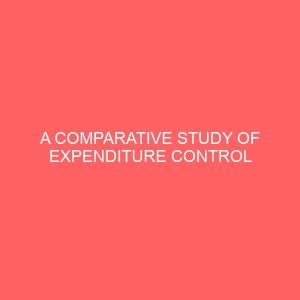WE CAN GET ANY MATERIAL FOR YOU
Do you want a project Material different from this, Contact us
We can buy from other sites for you
09036857618




ABSTRACT
This research work on A Comparative Study of Expenditure Controls method in Government and private Hospitals is aimed at studying and analysing the different methods of expenditure control that is being adopted by these hospitals, their practical application and their level of effectiveness. It is aimed at carrying out a comparative analysis of two hospitals. To achieve the aim of this research, secondary data through textbooks and journals were used to review some of the related literatures. Equally, questionnaires, interview and observation, which sought to find out facts needed for analysing, were used. The questionnaires were analyzed by simple percentages while hypothesis were tested using chisquare statistics. The findings of the analysis indicate among others that the method of expenditure control used by both hospitals are not the same; The daily control method for private hospitals and the vote card method for Government Hospitals. The different methods of expenditure control used by the two hospitals are effective, but with slight loopholes associated with vote card method. I recommend among others that both hospitals should adhere strictly to authorization procedure for drug purchased and materials purchases. Both hospitals should exhibit high degree of cash management and employ competent personnel for proper and efficient expenditure control.
CHAPTER ONE
1.0 INTRODUCTION
1.1 BACKGROUND OF THE STUDY
Expenditure control or cost control is part of management control process, in every organisation.
This process is very important to any organisation be it profit making organisation or nonprofit making organisation. Thus, lack of this practice in any organisation will cause misapplication of cash in cash disbursement process and this will create a very big problem leading the organisation into deficit and at an extreme case, the organisation might wind up. Many researches have been conducted in the reason for winding up of companies and organisation in which lack of expenditure control process had found responsible.
Expenditure control has been defined as the process by which managers utilize effectively and efficiently, the scarce resource in the achievement of the organisational goals. At this juncture, let us look at expenditure and control from separate perspective.
Expenditure is the total amount spent on the process of trying to achieve a particular organisational goal. Control means to order, limit, instruct or rule something or someones actions. It is used by either government officials or organisation managers to make restrictions on wages increases, immigrate credit and so on which are all expenditure.
As regards, this research work, which is the comparative study of expenditure control methods in government and privately owned Hospitals, A study of the University of Nigeria Teaching Hospital Enugu UNTH and Toronto Hospital and Maternity Onitsha; this implies a comparative study of nonprofit making organisations, since UNTH is government owned Hospital while Toronto Hospital is privately owned Hospital as a category of profit making organisation. Nonprofit making organisations are characterized by the following:
a There is neither a conscious profit motive nor an expectation of earning net income.
b No profit of any excess of revenue over expenditure is distributed to those who contributed support through taxes and voluntary donations.
In profit making organisations, the reverse of these characteristics is the case in the sense that their major objective is to maximize profit and excess of revenue over expenditure are given to the owners of the organisation.
Government owned hospitals pay more attention to services they render to the public, as their major objectives is to provide services that fulfil a social needs for those who do not have the purchasing power to acquire these services themselves. Irrespective of the fact that privately owned hospitals try to render good and quality services to the public, they pay more attention to maximize of profit which their major objective.
Comparative study of expenditure control in Government and privately owned Hospital which is major research question in this research work has to with the different ways and methods by which expenditure is being controlled in each of the hospitals so that they will not run into deficit or liquidations.
1.2 STATEMENT OF THE PROBLEM
The problems encountered by the Government and privately owned Hospitals in expenditure control are as follows:
The problem of daily control method and the vote card method. The problem encountered is to know the effective method to use in the two hospitals. Here, the problem encountered is to check whether the daily control method will be efficient and effective in the Government owned hospitals or whether the vote card method is the best.
Another problem encountered by the hospitals in expenditure control is the problem of internal control. Internal control is the essential feature of an organisation, be it profit making or nonprofit making, and it is expected to be well managed effectively and efficiently.
Any problem or limitation of the internal control will pose a problem to the expenditure control of the organisation.
Therefore, the above problems encountered by the two hospitals are the problems of expenditure control methods encountered by the government and privately owned hospitals by the government and privately owned hospitals that attracted the attention of the researcher.
The problem definition in this research work is to investigate and analyse the different ways and methods by which expenditure is controlled in government owned hospitals and privately owned hospitals so that they will not run into deficit and liquidation. As a comparative study, two hospitals has been selected for the study, they are: University of Nigeria Teaching Hospital Enugu UNTH for government owned Hospitals, and Toronto Hospital and Maternity Onitsha for privately owned hospitals.
In this research, we study the different methods of expenditure control being adopted by these hospitals and their practical application and their level of effectiveness.
This study will form a basis for our analysis which will help to answer some research questions.
1.3 OBJECTIVES OF THE STUDY
This study is conducted to:
1. Ascertain the expenditure control method adopted by the government and privately owned hospitals.
2. Establish whether government and privately owned hospitals are operating the same of different system of accounting.
3. Compare the expenditure method or model adopted by the privately owned hospitals with that of the government owned hospital if there is a difference.
4. Ascertain the efficiency and effectiveness of these expenditure control methods in the operation of the privately and government owned hospitals.
5. Make recommendations based on the findings.
1.4 RESEARCH QUESTIONS
1. What expenditure control methods are adopted in the two hospitals
2. Do privately owned hospitals and government owned hospitals operate the same method of expenditure control
3. Are there any similarities and differences in their method and application
4. How efficient and effective are they to their users
1.5 FORMULATION OF HYPOTHESIS
In this study, we will have two main types of hypothesis; the null hypothesis denoted by H0 and Alternative hypothesis denoted by H1. The null hypothesis is constructed such that it can be accepted if the alternative hypothesis is rejected.
Accordingly, the researcher would examine the following hypothesis.
HYPOTHESIS 1
H0: Government and privately owned hospitals do not adopt the daily control method of expenditure control.
H1: Government and privately owned hospitals adopt the daily control method of expenditure control.
HYPOTHESIS 11
H0: Government and privately owned hospitals do not use the same method of expenditure control.
H1: Government and privately owned hospitals uses the same methods of expenditure control
1.6 SIGNIFICANCE OF THE STUDY
Control has to be exercised over all aspect of a business organisation as a guard against any form of derailment from the organisations objective.
Therefore, the need to install an effective and efficient expenditure control method in any organisation be it profit making or nonprofit oriented cannot be over emphasised. This is because lack of this practice expenditure control in any organisation profit oriented or nonoriented will cause misapplication of cash in cash disbursement exercise. Thus may create a very high problem which may lead the organisations into deficit and in extreme cases, the organisation may wind up.
Being a comparative study, it will be useful to policy formulations in health related issues, hospitals management board and potential managers of the hospitals.
1.7 SCOPE OF THE STUDY
The study is on the expenditure control method on government and privately owned hospitals, as a comparative study, it will be limited to the accounting sections of the hospitals, which deals with its income and expenditure. However, other issue which has direct implication on the control aspect will be treated.
1.8 LIMITATIONS OF THE STUDY
Like every other research work, a lot of things posed as limitations to the research. They include:
a Financial: The present economic constraint in the country makes it difficult for some families to feed well. Parents are faced with the difficulty of training their children, especially those who have children in the university find it difficult to pay their fees much more sponsoring the research project work. The researcher of this project is not an exception. So also, she uses the limited resources within her reach to make this research work a reality.
b Time: The interval between chosen of project topic, the submission of the project and the preparation for the degree exams is very infinitesimal, but these are mandatory activities and hence, the researcher was deprived of many other activities to ensure their fulfilment.
c Attitude of workers: owing to the fact that so many workers employees are not aware of what research is all about and its importance, they have nonchallant attitude towards the researcher making it difficult for her to get the informations needed
1.9 DEFINITIONS OF TERMS
For the purpose of clarity, the following terms used in this context are hereby elaborated.
Expenditure control: Management tools that guides and ensures that company/organisational spending are in accordance with the policy plans.
Misappropriation: To steal something that you have been trusted to take care of and use it for your own personal benefit.
Comparative study: to examine the difference between two or more things.
Audit guidelines: These are basic principles and practices which members are expected to adhere to in the conduct of audit work.
Government owned hospitals: Hospitals owned and controlled by government either federal or state government.
Liquidation: To cause a business to fold up so that its assets can be sold to pay its debts.
₦3,200.00 ₦3,000.00
Do you want a project Material different from this, Contact us
Reviews
There are no reviews yet.